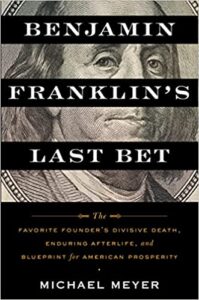The Volunteer Who Documented the Emergence of Philanthropy in America
by Jeremiah Norris (Colombia 1963-65)
•

Michael Meyer
Michael Meyer, who served as a Volunteer in China 1995-97, has published Benjamin Franklin’s Last Bet: The Favorite Founder’s Divisive Death, Enduring Afterlife, and Blueprint for American Prosperity. In it, he documented how Franklin, at the end of his life, made a “deathbed wager” on the survival of the United States: a gift totaling two thousand pounds to Boston and Philadelphia, to be lent out to tradesmen, over the next two centuries to jump start their careers. Each loan would be repaid with interest over ten years. If all went according to Franklin’s inventive scheme, the final payout in 1991 would be a windfall.
The concept that Franklin set in place can easily be seen as the institutional basis for the subsequent emergence of foundations in America, emerging from a seed grant that in its time was considered as a ‘charitable’ donation, then progressing to its designation today as “philanthropic giving.” This is most particularly expressed in terms of how an original philanthropic grant can be used to initiate what became known as foundations, and how the original contribution can be supplemented by interest, largely via the miracle of compound interest. A good example of this is the Rockefeller Foundation, founded in 1923 with a grant of some $300 million. It was used to fund a Hookworm eradication program in America’s South, a vile disease that had reduced overall economic production over the previous century. Today, the Foundation has a value of $4.1 billion — and Hookworm is a disease of the past! That original contribution by John Rockefeller also founded the University of Chicago, and the Rockefeller University, among many other achievements which emanated from that seed grant of $300 million (in 1923 dollars).
Meyer’s earlier books
From his service in China, Michael published the acclaimed The Last Days of Old Beijing: Life in the Vanishing Backstreets of a City Transformed, his second book, In Manchuria: A Village Called Wasteland and the Transformation of Rural China, and the third book in his China trilogy, The Road to Sleeping Dragon: Learning Chinese from the Ground Up.
His stories have appeared in the New York Times, The Wall Street Journal, Time, Smithsonian, Sports Illustrated, Slate, the Financial Times, the Chicago Tribune, the Iowa Review, the Paris Review, and National Public Radio’s “This American Life.” Michael has received a National Endowment for the Humanities Public Scholar Award, the Berlin Prize, and residencies at MacDowell, the New York Public Library’s Cullman Center for Scholars and Writers, and the Rockefeller Foundation Bellagio Center in Italy. He is a Fellow of the National Committee on United States-China Relations Public Intellectuals Program and is affiliated faculty with the University of Pittsburgh’s Asian Studies Center.
Back to philanthropy
Benjamin Franklin can well be referred to as the Founding Father of modern American philanthropy, though in his time this was referred to as “charity.” In terms of the U. S. Total Economic Engagement with Developing Countries, the University of Indiana’s Institute of Philanthropy reports in 2018 that of some $400 billion in total outlays, 11% was from foundations, and 26% was from corporations — but only 9% was from Official Development Assistance, e.g., foreign aid.’ The remainder of this sum came from universities and religious organizations.
The amount given by corporations is obscured by a new form of philanthropy referred to as ‘cause-related’ giving. Due to the increasing costs of corporations having to maintain a large legal staff to document and justify donations to the IRS, many of them now charge off donations to their marketing or advertising departments and list them as “expenses.” For instance, if one buys a cup of coffee at a Starbucks, printed alongside the lip will be this notation: You have just donated 10 cents to Save the Forest in Brazil. It is not known how much corporations charge off these donations as “expenses,” but philanthropic experts suggest that it must be in the billions of dollars.
Back to Ben Franklin
Pryor to passing away, Franklin bequeathed 1,000 pounds (about $4,400 at the time or about $125,000 in 2021 dollars) each to Boston and Philadelphia, in trust to gather interest for 200 years. The trust began in 1785 when a French mathematician wrote a friendly parody of Franklin’s Poor Richard’s Almanac called Fortunate Richard. The main character leaves a smallish amount of money in his will to collect interest over one, two three, four or five full centuries, with the resulting astronomical sums to be spent on impossibly elaborate utopian projects. Franklin, who was 79-years-old at the time, wrote thanking him for a great idea and telling him that he had decided to leave a bequest of 1,000 pounds each to his native Boston and his adopted Philadelphia.
By 1990, more than $2,000,000 had accumulated in Franklin’s Philadelphia Trust, which had loaned the money to local residents. From 1940-1990, the money was used mostly for mortgage loans. When the trust came due, Philadelphia decided to spend it on scholarships for local high school students. Franklin’s Boston trust had accumulated almost $5,000,000 during the same time; at the end of its first 100 years, a portion was allocated to help establish a trade school that became the Franklin Institute of Boston, and the entire fund was later dedicated to supporting this Institute.
Franklin’s multi-generational gift was largely unknown before Michael brought it into the public square. A Peace Corps WorldWide article showed “how Franklin’s stake in the ‘leather apron’ class remains in play to this day, offering an inspiring blueprint for prosperity in our modern era of growing wealth disparity and social division”, amply demonstrating the quantum power of philanthropy over time, meriting him A Profile in Citizenship.
•
 Benjamin Franklin’s Last Bet: The Favorite Founder’s Divisive Death, Enduring Afterlife, and Blueprint for American Prosperity
Benjamin Franklin’s Last Bet: The Favorite Founder’s Divisive Death, Enduring Afterlife, and Blueprint for American Prosperity
by Michael Meyer (China 1995-97)
Mariner Books
April 2022
362 pages
$26.09 (Hardcover); $15.99 (Kindle); $26.99 (audio book)
No comments yet.
Add your comment